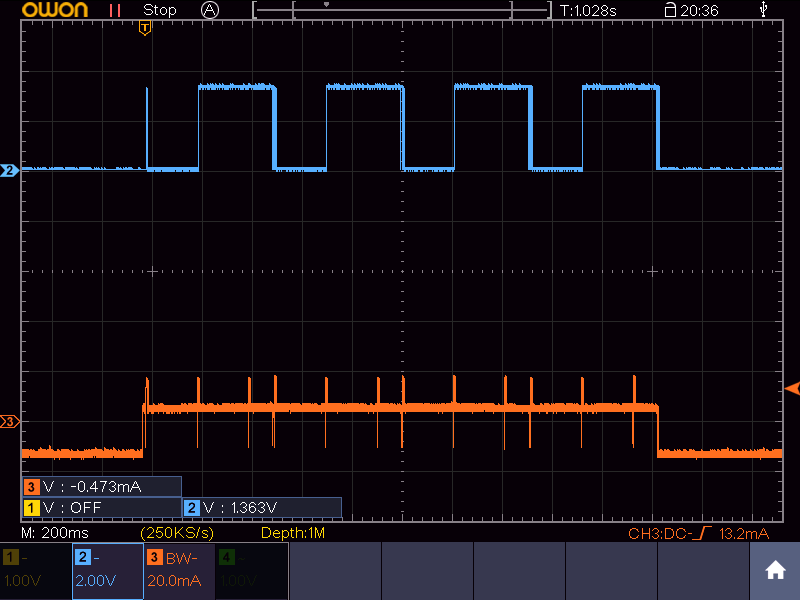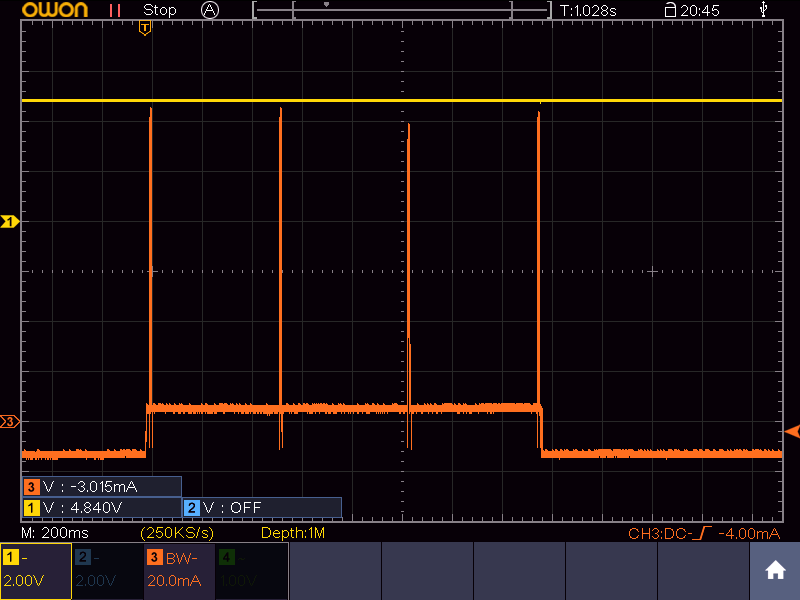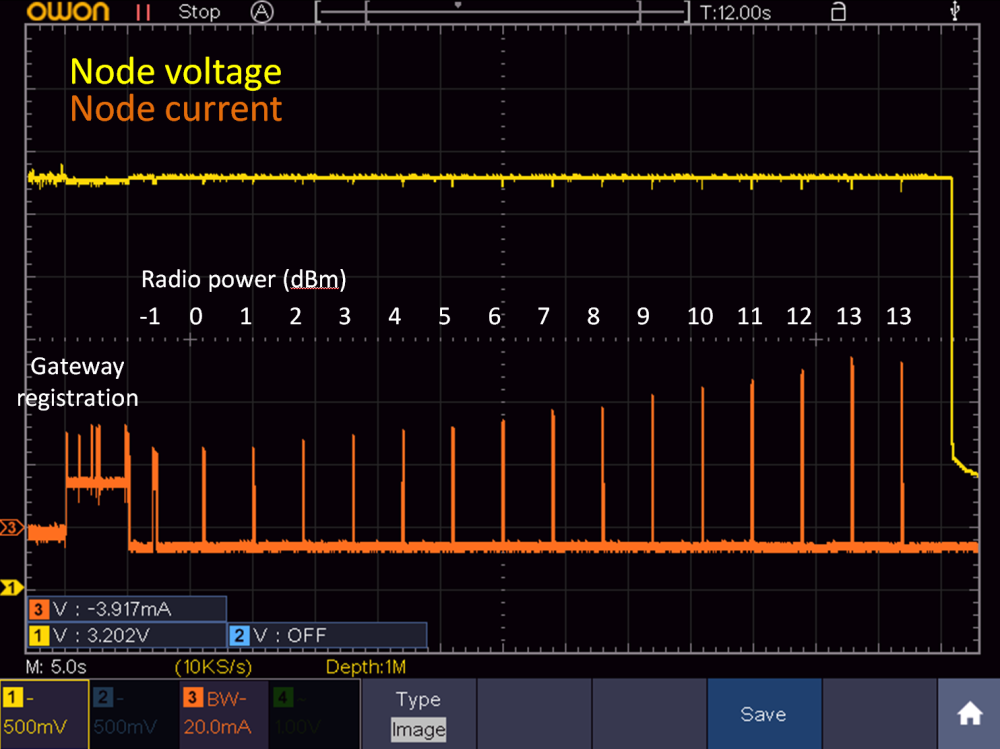@prelektr Because I wasn't making much progress, I gave up on this and added an Arduino Nano gateway that communicates with the RPi via UART. Then the ATC works. The Nano (clone) is just a $2 board, so it isn't a big deal to add it.
TSD
Posts
-
RFM69 ATC not working? -
RFM69 ATC not working?@gohan
I couldn't get the RSSI measurement on the gateway to work, so I'm not doing that.I want to get ATC to work. As ATC uses RSSI to optimize power, a correct RSSI measurement (on the node) is needed. ATC (and so the RSSI measurement) works well on an Arduino gateway, but not on a RPi.
As I don't have a software background and am still newish to MySensors, I'm hoping someone on the forum knows what to do. In the meantime, I'll keep digging myself :)
-
RFM69 ATC not working?@scalz
I found your name in the Raspberry Pi MySensor driver files. Would you happen to know why the RSSI measurement for a RPi gateway doesn't work? I'm having trouble getting ATC to work with my RPi gateway. It works well with an Arduino gateway. -
RFM69 ATC not working?@mfalkvidd
And if you turn on ATC? Does that work? Are you on 2.3.0? -
RFM69 ATC not working?@gohan
I just tried with the node on MySensors 2.2.0, but I get the same result. I cannot get the gateway to compile with 2.2.0, I get the following errors:In file included from ./MySensors.h:49:0, from examples_linux/mysgw.cpp:83: ./drivers/RFM69/new/RFM69_new.cpp: In function ‘bool RFM69_initialise(uint32_t)’: ./MyConfig.h:716:26: error: ‘DEFAULT_RFM69_IRQ_NUM’ was not declared in this scope #define MY_RFM69_IRQ_NUM DEFAULT_RFM69_IRQ_NUM ^ ./drivers/RFM69/new/RFM69_new.cpp:230:18: note: in expansion of macro ‘MY_RFM69_IRQ_NUM’ attachInterrupt(MY_RFM69_IRQ_NUM, RFM69_interruptHandler, RISING); ^~~~~~~~~~~~~~~~ In file included from ./MySensors.h:347:0, from examples_linux/mysgw.cpp:83: ./hal/transport/MyTransportRFM69.cpp: In function ‘uint8_t transportReceive(void*)’: ./hal/transport/MyTransportRFM69.cpp:80:54: error: ‘RFM69_recv’ was not declared in this scope return RFM69_recv((uint8_t*)data, MAX_MESSAGE_LENGTH); ^ In file included from ./MySensors.h:343:0, from examples_linux/mysgw.cpp:83: ./drivers/RFM69/new/RFM69_new.cpp: At global scope: ./drivers/RFM69/new/RFM69_new.cpp:749:12: warning: ‘void RFM69_encrypt(const char*)’ defined but not used [-Wunused-function] LOCAL void RFM69_encrypt(const char *key) ^~~~~~~~~~~~~ ./drivers/RFM69/new/RFM69_new.cpp:599:12: warning: ‘void RFM69_ATCmode(bool, int16_t)’ defined but not used [-Wunused-function] LOCAL void RFM69_ATCmode(const bool onOff, const int16_t targetRSSI) ^~~~~~~~~~~~~ ./drivers/RFM69/new/RFM69_new.cpp:340:15: warning: ‘uint8_t RFM69_receive(uint8_t*, uint8_t)’ defined but not used [-Wunused-function] LOCAL uint8_t RFM69_receive(uint8_t *buf, const uint8_t maxBufSize)Do you have the gateway running with 2.2.0? And ATC works for the RFM69?
-
RFM69 ATC not working?@gohan @mfalkvidd
I think it is related to the Raspberry Pi implementation of MySensors. If I use an Arduino/RFM69 gateway, the RSSI is as expected. At close range, the power drops to the minimum possible level and the RSSI is strong. I noticed that the interrupt pin is toggled during communication, see picture below (orange is node current, blue is gateway interrupt).

If I use the Raspberry gateway (with origin/development-3.0.0 MySensors), I get the following result (orange is node current, yellow is gateway interrupt). The same result is obtained with MySensors 2.3.0 (origin/master). I couldn't get the origin/development version to compile. It gives an error about MY_DEBUGDEVICE.

Apart from the much higher node current (and worse RSSI), the interrupt pin is always high and not toggled.Are you guys using a Raspberry gateway, or an Arduino gateway?
I haven't had time to dig into to the MySensors code further, but does any of you know if this could be the problem?
-
RFM69 ATC not working?@gohan
I added your code to my node. It gives exactly the same results as my own code. What kind of node are you using? Are you using the HW or W version of the RFM69? -
RFM69 ATC not working?@mfalkvidd
My code now looks pretty much the same as yours, except for the OTA stuff. But I don't see gateway messages in Domoticz. The node shows up with all its measurements.#define MY_DEBUG_VERBOSE_GATEWAY #include <MySensors.h> MyMessage msgRSSI(1,V_LEVEL); #define ARDUINO 100 // This space is intended to be used to include arduino libraries #undef ARDUINO void setup() { // Setup locally attached sensors } void presentation() { // Present locally attached sensors here present(1,S_SOUND); } void loop() { // Send locally attached sensors data here } void receive(const MyMessage &message) { int16_t rssiReceive = RFM69_getReceivingRSSI(); if (message.sender == 1 ) { send(msgRSSI.set(rssiReceive,0)); } }Is the gateway supposed to show up as a measurement? Any idea why that doesn't happen?
-
RFM69 ATC not working?If I run "make install" while the code has not compiled yet, it will compile before installing. If you first run "make" seperately, "make install" will only install.
I'm almost there. I configured an Ethernet gateway (couldn't get serial gateway to work) and can now see the temperature, receive RSSI and sending RSSI from the node in Domoticz.
The gateway receive function shows up as "S_ARDUINO_REPEATER_NODE", but there's no data yet.
What data should I pass on to your receive function? My gateway code is now as follows:
#define MY_DEBUG_VERBOSE_GATEWAY #include <MySensors.h> MyMessage msgTemp(1,V_TEMP); MyMessage msgRSSI(2,V_LEVEL); #define ARDUINO 100 // This space is intended to be used to include arduino libraries #undef ARDUINO void setup() { // Setup locally attached sensors } void presentation() { // Present locally attached sensors here present(2,S_SOUND); } void loop() { // Send locally attached sensors data here receive(msgTemp); } void receive(const MyMessage &message) { int16_t rssiReceive = RFM69_getReceivingRSSI(); if (message.sender == 1 ) { send(msgRSSI.set(rssiReceive,0)); } } -
RFM69 ATC not working?@mfalkvidd
Do you mean#define MY_DEBUG_VERBOSE_GATEWAYThat uses the GATEWAY_DEBUG("text") macro that you are referring to. I tried that, but it doesn't give any additional output in the log.
Yes, this is the complete code I run:
sudo ./configure --my-transport=rfm69 --my-rfm69-frequency=868 --my-is-rfm69hw --my-gateway=serial --my-serial-is-pty --my-serial-pty=/dev/ttyUSB020 sudo make install sudo systemctl start mysgw.serviceBut ttyUSB020 doesn't appear in /dev afterwards, nor does Domoticz list it.
-
RFM69 ATC not working?#define GATEWAY_DEBUG(text)or
#define MY_DEBUGdoesn't show any additional messages in the log, besides the node messages.
In the mean time I installed Domoticz to try it your way, but don't see the USB port that I tried to make by installing the serial gateway (ttyUSB020, which is not in /dev yet, so should be free).
This command should take care of that, right?
./configure --my-gateway=serial --my-serial-is-pty --my-serial-pty=/dev/ttyUSB020Sorry to be such a pain, but I would really like to get this sorted out.
-
RFM69 ATC not working?@mfalkvidd
I was using serial gateway by the way. -
RFM69 ATC not working?@mfalkvidd
I improved the power supply of the RFM (added linear regulator) on the gateway and the error is gone.The code doesn't compile if I don't declare msgTemp, as I use msgTemp in the main loop.
Where should I see the message the GW is sending? On the node? I'm using a custom node without a serial connection, so I can't see incoming messages on the node. Is there a way to have the GW send the RSSI to its own log?
-
RFM69 ATC not working?@mfalkvidd
I modified my code to include your receive function, but I wasn't sure how to use it in the main loop.#include <MySensors.h> MyMessage msgTemp(1,V_TEMP); MyMessage msgRSSI(2,V_LEVEL); #define ARDUINO 100 // This space is intended to be used to include arduino libraries #undef ARDUINO void setup() { // Setup locally attached sensors } void presentation() { // Present locally attached sensors here present(1,S_SOUND); } void loop() { // Send locally attached sensors data here receive(msgTemp); } void receive(const MyMessage &message) { int16_t rssiReceive = RFM69_getReceivingRSSI(); if (message.sender == 1 ) { send(msgRSSI.set(rssiReceive,0)); } }I figured that you have to use your receive function to capture a message from the node and then do an RSSI measurement. Since I have a msgTemp coming from the node, I used that.
After compiling the code and running the SGW, I get the following error in the logs:
Serial - write failed: Resource temporarily unavailableDo you know what I did wrong?
-
RFM69 ATC not working?@mfalkvidd
OK, tnx for now. I'll look at gateway rssi tomorrow evening -
RFM69 ATC not working?@mfalkvidd
I added a sending a temperature measurement before RFM69_getReceivingRSSI and enabled ATC, but get a similar result. The code is now as follows (I cleaned up the comments):txPower = RFM69_getTxPowerLevel(); // Get TX power float temperature = readTemp705x(); // Read temperature send(msgTemp.set(temperature, 1),0); // Send temperature rssiSend = RFM69_getSendingRSSI(); rssiReceive = RFM69_getReceivingRSSI(); send(msgRSSI.set(txPower,2)); // Send TX power send(msgRSSI.set(rssiSend,3)); // Send sending RSSI send(msgRSSI.set(rssiReceive,3)); // Send receiving RSSIThe gateway log shows that the power is increased until the maximum allowed (20 dBm), but no change in RSSI.
TSF:MSG:READ,12-12-0,s=1,c=1,t=0,pt=7,l=5,sg=0:23.8 TSF:MSG:READ,12-12-0,s=3,c=1,t=24,pt=7,l=5,sg=0:11.00 TSF:MSG:READ,12-12-0,s=3,c=1,t=24,pt=7,l=5,sg=0:-79.000 TSF:MSG:READ,12-12-0,s=3,c=1,t=24,pt=7,l=5,sg=0:-42.000 TSF:MSG:READ,12-12-0,s=1,c=1,t=0,pt=7,l=5,sg=0:23.8 TSF:MSG:READ,12-12-0,s=3,c=1,t=24,pt=7,l=5,sg=0:13.00 TSF:MSG:READ,12-12-0,s=3,c=1,t=24,pt=7,l=5,sg=0:-96.000 TSF:MSG:READ,12-12-0,s=3,c=1,t=24,pt=7,l=5,sg=0:-42.000 TSF:MSG:READ,12-12-0,s=1,c=1,t=0,pt=7,l=5,sg=0:23.8 TSF:MSG:READ,12-12-0,s=3,c=1,t=24,pt=7,l=5,sg=0:17.00 TSF:MSG:READ,12-12-0,s=3,c=1,t=24,pt=7,l=5,sg=0:-97.000 TSF:MSG:READ,12-12-0,s=3,c=1,t=24,pt=7,l=5,sg=0:-42.000 TSF:MSG:READ,12-12-0,s=1,c=1,t=0,pt=7,l=5,sg=0:23.8 TSF:MSG:READ,12-12-0,s=3,c=1,t=24,pt=7,l=5,sg=0:20.00 TSF:MSG:READ,12-12-0,s=3,c=1,t=24,pt=7,l=5,sg=0:-96.000 TSF:MSG:READ,12-12-0,s=3,c=1,t=24,pt=7,l=5,sg=0:-43.000Any idea why this doesn't work?
I'm using a Raspberry Pi gateway now, is it easy to measure RSSI on that as well? I can switch to an Arduino gateway if required.
-
RFM69 ATC not working?@mfalkvidd
These numbers are from the node point of view.In the main loop, there's a piece of code that contains the RSSI measurements:
RFM69_setTxPowerLevel(i); txPower = RFM69_getTxPowerLevel(); rssiReceive = RFM69_getReceivingRSSI(); rssiSend = RFM69_getSendingRSSI(); send(msgRSSI.set(txPower,2)); // Send receiving RSSI send(msgRSSI.set(rssiSend,3)); // Send sending RSSI send(msgRSSI.set(rssiReceive,3)); // Send sending RSSIShould I use these functions differently?
-
RFM69 ATC not working?I want to use my MySensors/RFM69HW node with the lowest power possible. However, with ATC enabled, I noticed that the power is always adjusted to the maximum level possible. To investigate, I did an experiment in which I disabled ATC and increased the radio power from -2dBm to 13dBm and have the node send the receiving RSSI and sending RSSI. I recorded both the node voltage and current, as shown in the image below.

It is clear that the radio power is linearly increased, which is good. However, the reported receiving/sending RSSIs do not change, as shown by the following gateway log (format: TX power, receiving RSSI, sending RSSI):
TSF:MSG:READ,12-12-0,s=3,c=1,t=24,pt=7,l=5,sg=0:-2.00 TSF:MSG:READ,12-12-0,s=3,c=1,t=24,pt=7,l=5,sg=0:-98.000 TSF:MSG:READ,12-12-0,s=3,c=1,t=24,pt=7,l=5,sg=0:-66.000 TSF:MSG:READ,12-12-0,s=3,c=1,t=24,pt=7,l=5,sg=0:-1.00 TSF:MSG:READ,12-12-0,s=3,c=1,t=24,pt=7,l=5,sg=0:-96.000 TSF:MSG:READ,12-12-0,s=3,c=1,t=24,pt=7,l=5,sg=0:-67.000 TSF:MSG:READ,12-12-0,s=3,c=1,t=24,pt=7,l=5,sg=0:0.00 TSF:MSG:READ,12-12-0,s=3,c=1,t=24,pt=7,l=5,sg=0:-99.000 TSF:MSG:READ,12-12-0,s=3,c=1,t=24,pt=7,l=5,sg=0:-66.000 TSF:MSG:READ,12-12-0,s=3,c=1,t=24,pt=7,l=5,sg=0:1.00 TSF:MSG:READ,12-12-0,s=3,c=1,t=24,pt=7,l=5,sg=0:-102.000 TSF:MSG:READ,12-12-0,s=3,c=1,t=24,pt=7,l=5,sg=0:-64.000 TSF:MSG:READ,12-12-0,s=3,c=1,t=24,pt=7,l=5,sg=0:2.00 TSF:MSG:READ,12-12-0,s=3,c=1,t=24,pt=7,l=5,sg=0:-100.000 TSF:MSG:READ,12-12-0,s=3,c=1,t=24,pt=7,l=5,sg=0:-62.000 TSF:MSG:READ,12-12-0,s=3,c=1,t=24,pt=7,l=5,sg=0:3.00 TSF:MSG:READ,12-12-0,s=3,c=1,t=24,pt=7,l=5,sg=0:-96.000 TSF:MSG:READ,12-12-0,s=3,c=1,t=24,pt=7,l=5,sg=0:-61.000 TSF:MSG:READ,12-12-0,s=3,c=1,t=24,pt=7,l=5,sg=0:4.00 TSF:MSG:READ,12-12-0,s=3,c=1,t=24,pt=7,l=5,sg=0:-100.000 TSF:MSG:READ,12-12-0,s=3,c=1,t=24,pt=7,l=5,sg=0:-61.000 TSF:MSG:READ,12-12-0,s=3,c=1,t=24,pt=7,l=5,sg=0:5.00 TSF:MSG:READ,12-12-0,s=3,c=1,t=24,pt=7,l=5,sg=0:-96.000 TSF:MSG:READ,12-12-0,s=3,c=1,t=24,pt=7,l=5,sg=0:-60.000 TSF:MSG:READ,12-12-0,s=3,c=1,t=24,pt=7,l=5,sg=0:6.00 TSF:MSG:READ,12-12-0,s=3,c=1,t=24,pt=7,l=5,sg=0:-92.000 TSF:MSG:READ,12-12-0,s=3,c=1,t=24,pt=7,l=5,sg=0:-60.000 TSF:MSG:READ,12-12-0,s=3,c=1,t=24,pt=7,l=5,sg=0:7.00 TSF:MSG:READ,12-12-0,s=3,c=1,t=24,pt=7,l=5,sg=0:-97.000 TSF:MSG:READ,12-12-0,s=3,c=1,t=24,pt=7,l=5,sg=0:-59.000 TSF:MSG:READ,12-12-0,s=3,c=1,t=24,pt=7,l=5,sg=0:8.00 TSF:MSG:READ,12-12-0,s=3,c=1,t=24,pt=7,l=5,sg=0:-97.000 TSF:MSG:READ,12-12-0,s=3,c=1,t=24,pt=7,l=5,sg=0:-66.000 TSF:MSG:READ,12-12-0,s=3,c=1,t=24,pt=7,l=5,sg=0:9.00 TSF:MSG:READ,12-12-0,s=3,c=1,t=24,pt=7,l=5,sg=0:-100.000 TSF:MSG:READ,12-12-0,s=3,c=1,t=24,pt=7,l=5,sg=0:-60.000 TSF:MSG:READ,12-12-0,s=3,c=1,t=24,pt=7,l=5,sg=0:10.00 TSF:MSG:READ,12-12-0,s=3,c=1,t=24,pt=7,l=5,sg=0:-97.000 TSF:MSG:READ,12-12-0,s=3,c=1,t=24,pt=7,l=5,sg=0:-59.000 TSF:MSG:READ,12-12-0,s=3,c=1,t=24,pt=7,l=5,sg=0:11.00 TSF:MSG:READ,12-12-0,s=3,c=1,t=24,pt=7,l=5,sg=0:-100.000 TSF:MSG:READ,12-12-0,s=3,c=1,t=24,pt=7,l=5,sg=0:-64.000 TSF:MSG:READ,12-12-0,s=3,c=1,t=24,pt=7,l=5,sg=0:12.00 TSF:MSG:READ,12-12-0,s=3,c=1,t=24,pt=7,l=5,sg=0:-102.000 TSF:MSG:READ,12-12-0,s=3,c=1,t=24,pt=7,l=5,sg=0:-58.000 TSF:MSG:READ,12-12-0,s=3,c=1,t=24,pt=7,l=5,sg=0:13.00 TSF:MSG:READ,12-12-0,s=3,c=1,t=24,pt=7,l=5,sg=0:-100.000 TSF:MSG:READ,12-12-0,s=3,c=1,t=24,pt=7,l=5,sg=0:-66.000The receiving RSSI is always about -100dBm and the sending RSSI is always around -60/-70 dBm.
The RFM69HW has a 22uF ceramic capacitor and a 480uF elcap to decouple its power supply.
I used MySensors 2.2.0 for this measurement, but I get the same result with 2.3.0.
Does anyone have a clue what may be causing the RSSI to be independent of the transmit power?
-
AC -DC transformer sourcing@jeremushka
Indeed, it is a complex way to switch on a lamp, but if you only want to change the switch, I guess it's what you need to do. It would be much easier to insert something at the light bulb, as your neutral is available there.
My French is not that good, but I think you can solve your "va et vient" by changing the NO relay in your reference schematic with a NO/NC relay (SPDT switch). -
AC -DC transformer sourcingHi Jeremushka,
Are you designing your own AC/DC power supply? For low power levels (<20W), typically flyback converters are used.
If you want to build your own flyback converter, you could use this controller IC:
https://ac-dc.power.com/products/tinyswitch-family/tinyswitch-4/And this transformer: https://www.soselectronic.com/products/myrra/74010-48847
If you're looking for a complete solution, the Aliexpress converter suggested by @poordom looks good, the 5V version can be found here and is even cheaper:
https://www.aliexpress.com/item/5V-700mA-3-5W-AC-DC-Precision-Buck-Converter-AC-220v-to-5v-DC-step-down/32677330307.html?gps-id=pcDetailBottomMoreThisSeller&scm=1007.13339.99734.0&scm_id=1007.13339.99734.0&scm-url=1007.13339.99734.0&pvid=a8341147-314f-4c36-aec2-aa63ad557688It's dirt cheap, I don't have any clue about its quality. I'm sure it'll work, I just don't know about its safety level.
